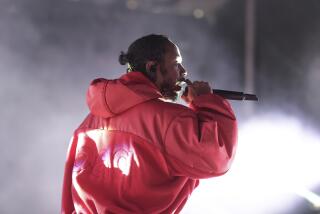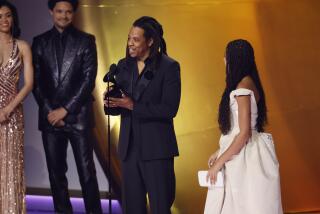Hail, Jay-Z, but ‘Kingdom’ isn’t exactly a royal return
- Share via
“It’s good to be the king!” declared Mel Brooks, playing Louis XVI in “The History of the World, Part 1,” as he strolled his palatial estate accosting courtesans. Complete with snicker and copped feel, the line revealed the pith of power’s lure.
I wonder if the phrase ever trips through the mind of Jay-Z (real name: Shawn Carter). He is the king of hip-hop, the pop genre most concerned with power and wealth, and he’s extolled his own preeminence in many a top-selling performance. Rubbing it in with the title of his new album, “Kingdom Come,” coming out Tuesday, the lord of lords known as Hova offers a tour of his own estate -- and state of mind. But the sovereign has lost his gusto.
“Kingdom Come” ends one of the briefest and most interrupted artistic retirements in history. Throne reclamation defines the album, along with some soul-searching about the meaning of success. Jay-Z’s success is fascinating, not only because it’s multifold (he spent his “break” becoming a chief executive, at Def Jam Records; a Bono-esque do-gooder who champions safe drinking water worldwide; and a tabloid celebrity in tandem with his girlfriend, singer Beyonce Knowles) but because as a kid from New York’s projects who has made the cover of Fortune magazine, he is an incredibly rare bird. Many rappers glory in wealth, but only Jay-Z’s mogul-ganger Sean P. Diddy Combs is as bent on penetrating white privilege.
Jay-Z’s boasts here have him driving a German luxury car (a Maybach) and palling around with “Chris and Gwyneth” -- that’s definitive white girl Gwyneth Paltrow and her husband, Coldplay frontman and boarding-school graduate Chris Martin, who co-wrote the album’s moody final track. Another cut, “Oh My God,” produced to a fever pitch by old Jay-Z pal Justin Blaze, has the rapper jetting from lunch with Nelson Mandela to Paris for fashion week. How does a former drug dealer negotiate the upper crust? If only “Kingdom Come” spent more time with that question.
Instead, Jay-Z loads up on testaments revealing his inner thug, hardly the most intriguing aspect of his psyche. His stable of veteran producers -- Blaze and Dr. Dre, mostly, with lackluster contributions from Kanye West, the Neptunes and Swizz Beats -- reflects his fear of losing credibility. Some tracks deliver: Dr. Dre, whose hair-raising slow grooves rub weirdly against Hova’s commandeering delivery, hypnotizes on “Lost Ones” (also notable for real introspection from Jay-Z), and Blaze tears up the house with the Beyonce-style “Show Me What You Got.” (“Hollywood,” Beyonce’s actual guest spot, is half-realized.) More musical risks might have taken Jay-Z into new mental spaces.
Instead, he stops himself when he hits on real, thorny emotions -- delivering his Hurricane Katrina eulogy, “Minority Report,” through crocodile tears -- and delivers what’s familiar. Packed with threats to younger rappers and reminders that he once dealt crack and still likes his women spicy (though he never admits to sneaking out on “B”), “Kingdom Come” could be titled “Cred, Come Back.”
There are high points. When he’s not repeating himself, Jay-Z’s verses flow like melting ice. In the relaxed “30 Something,” he describes maturity, in automotive terms: “I’m young enough to know the right car to buy, yet grown enough not to put rims on it.” The might-be-cheating song “Trouble” has the rhyme, “If my hand’s in the cookie jar know one thing / I’mma take the cookie, not leave my ring,” a metaphor worthy of Willie Dixon.
If he wants to save hip-hop, as he claims, Jay-Z needs to think beyond his usual game. He has the smarts and experience; perhaps his next comeback will show more royal ambition.
*
Jay-Z
“Kingdom Come” (Def Jam)
* * 1/2
More to Read
The biggest entertainment stories
Get our big stories about Hollywood, film, television, music, arts, culture and more right in your inbox as soon as they publish.
You may occasionally receive promotional content from the Los Angeles Times.










